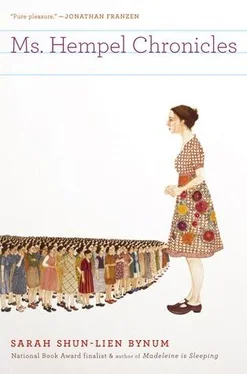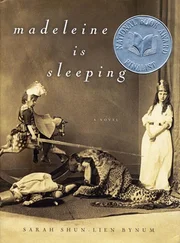They loved these facts, because reading about the abusive stepdad, the failures at school, the yearnings to escape, to be someone else — it made them feel terrible. “He had such a tough life,” they repeated, shaking their heads. “A really tough life.”
But, according to the back of the book, Toby prevailed. The kids saw, in the felicitous pairing of picture and blurb, a happy ending to his story: he became a writer! He didn’t turn into a drunk or a bum. The back cover promised that it was possible to weather unhappy childhoods, that it was possible to do lots of bad things and have lots of bad things done to you — and the damage would not be irreparable. Often a particularly somber discussion of Toby’s struggles would conclude with this comforting thought: “And now he’s a famous and successful writer.” Tobias Wolff.
Fame and success: did that count as revenge? The seventh grade had a lively sense of justice. They wanted to see Dwight pay for all that he had done to Toby and his mother, for all the pain he had inflicted. They longed for a climactic, preferably violent, showdown between the boy and the stepfather. Barring that, they wanted Dwight to suffer in some specific and prolonged way. The fact that he had to live with the meagerness of his own soul — this was not considered punishment enough.
“He’s probably read the book, right?” Will Bean asked.
“And he knows that Toby’s a famous writer?”
They relished this idea: Dwight as an unrepentant old man, hobbling down to the liquor mart, pausing by the brilliant window of a bookstore. And there’s Toby. Mustached, mischievous Toby, the same photograph from the back cover, only much larger. A careful pyramid of his books is pointing toward the sky. number one bestseller, the sign reads. Through the plate glass, the old man can hear the faint slamming of the cash register. He can see the customers taking their place in line. And he can make out, even though his eyes are old and rheumy, the title of the book that they hold in their hands.
“If he’s read it, he knows that millions of people now hate him, right?”
Which would mean, of course, banishment from the Elks Club. Divorce papers from his latest wife. Bushels of hate mail thumping against his screen door. Furtive trips to the convenience store, his mechanic’s jacket pulled up over his head.
“Well,” said Ms. Hempel. “I think he’s dead already.”
A howl filled the classroom.
“Usually writers don’t publish this type of book until the main characters have all passed away. So people’s feelings don’t get hurt.”
Dwight, cold in the ground before the book even reached the stores. It was the greatest unfairness of all.
“And Rosemary? She’s dead? She didn’t get to see how good a writer her son is? She didn’t get to see how well he turned out?” This, too, struck them as terribly unjust.
“No, no,” Ms. Hempel said. “Rosemary is still alive. I think. Look in the front pages of your book — he thanks her, he says that she corrected him on certain facts, on the chronology of the events.”
“Good.” The class looked relieved. “Okay.”
An opportunity for moral inquiry presented itself. “If you were writing a book about your life,” Ms. Hempel asked, “and you cast a person in an unflattering light, would you wait until that person died? Before you published your book?”
The kids didn’t see her point. “I couldn’t write a book. I don’t have enough to write about,” Simon Grosse said.
“That’s not true!” said Ms. Hempel. “Each of you could write a book. Several books, in fact.” She tried to remember what Flannery O’Connor had said on the subject. “Anyone who’s made it through childhood has enough material to last them until the day they die.”
“We haven’t made it through yet,” Henry Woo said.
“But you will,” said Ms. Hempel. “And when you do, you’ll have lots to write about. Everyone does interesting things when they’re kids.”
“And bad things, like Toby?”
“And bad things. Everyone has, even if everyone won’t admit it.”
The kids waited for a moment, as if they needed, for politeness’ sake, to make a show of digesting this information.
“Did you do bad things, Ms. Hempel?”
She should have expected it.
“Well. Be logical. Everyone includes me, doesn’t it?”
Greedily the kids leaned forward. “What kinds of bad things?” The back legs of desk-chairs rose into the air.
Ms. Hempel heaved an enormous sigh of resignation. She let her arms drop heavily to her sides. “You really want to know?” she groaned, as if she were finally, under great duress, capitulating to their demands. “You’re really going to make me do this?” In truth, she loved talking about herself. Especially to her students.
All heads nodded vigorously.
“I watched TV when I wasn’t supposed to. And sometimes I stayed out past my curfew.”
The back legs returned to the floor. “That’s it?”
“I wasn’t always considerate of my parents.”
David D’Sousa offered her a wan smile.
“And I pierced my nose with a sewing needle,” Ms. Hempel said. “My mother turned her face away every time I walked into the room, like she does when she’s watching a violent movie. She was furious at me.”
“Caroline Pratt pierced her belly button,” Adelaide observed. Caroline was an eighth grader. “She didn’t even use ice.”
Ms. Hempel shuffled through her collected misdeeds, trying to find ones that she could, in good conscience, share with seventh graders. “I used to like skateboarders. I would help them dye their hair — it made my hands all blotchy. And I was always getting in trouble for breaking the dress code at my school. Once I wore—”
“Ms. Hempel, did you always want to be a teacher?”
It startled her, the conversation veering off in this direction. But then it made sense to her: they believed they already knew the answer. Of course she had always wanted to be a teacher. They were giving her a way out. A way of explaining her unremarkable youth.
“No!” she said. “I certainly didn’t.”
“Why not?” And the question sounded reproachful. “You like teaching, don’t you?” Because suddenly there was the possibility that she didn’t. “You like being a teacher. And you were good at school.”
They said it with confidence. They treated it as a commonplace, an assumption that needn’t be challenged. But the fact that they had said it, the fact that the issue had arisen, in the midst of this tour through Ms. Hempel’s offenses, suggested that somewhere, in some part of themselves, they knew differently. It was astonishing, the efficiency with which they arrived at the truth. This was probably why children were so useful in stories and films about social injustice, like To Kill a Mockingbird. But Ms. Hempel didn’t think that this ability was particularly ennobling. It was just something they could do, the way dogs can hear certain high-pitched sounds, or the way X-rays can see past skin and tissue down to the ghostly blueprint of the bones.
Ms. Hempel sighed. A real one, this time.
“My school — it was demanding, academically. They had very high expectations of us.”
“So you were a really good student?”
“No,” Ms. Hempel said. “I wasn’t.”
And this, finally, impressed them.
“I did well on all the standardized tests — like the ERBs? — I scored very high on those. Anything with bubbles I was excellent at, or multiple choice. Even short answer. But it was hard for me to develop my ideas at length. You know, stick with an argument, weave different threads together.
“And my school placed a lot of emphasis on that. On essays, term papers, the final question on exams. It’s not because I didn’t have anything to say or because I didn’t have any ideas. I had lots of them, too many of them. My papers were hard to make sense of.
Читать дальше












